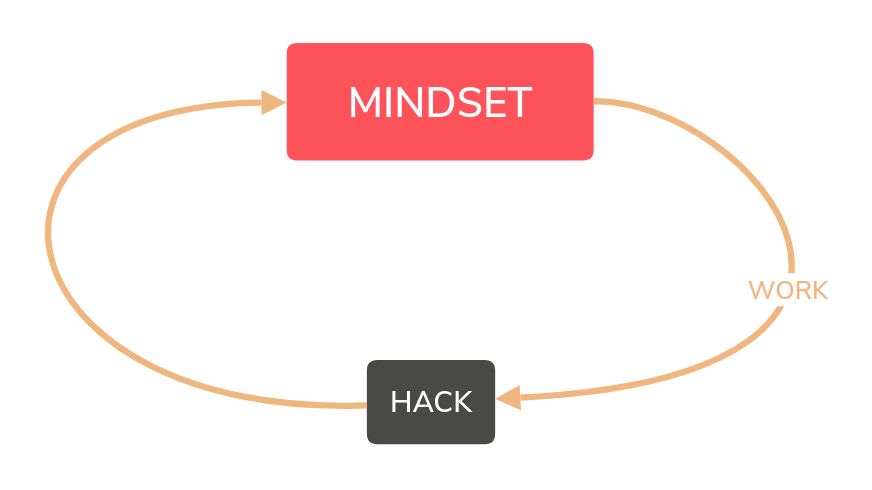In a previous post I put forth some thoughts regarding personal productivity. Well, I had an extremely productive week following that, just one. The past two weeks have been unsatisfying at best, still, there’s this constant exhaustion, a lingering feeling of tiredness. Why is it that a productive week feels less tiring than an unproductive one? Why is it that despite knowing that I am gonna regret the minutes I spend scrolling my Facebook feed or those random YouTube channels with sciency claims, I still let those minutes slip-by. There is an endless list of things enticing us with small dopamine bursts, taking away small but significant chunks of our time, we know it’s a trap, but still, keep falling. This is an attempt to explore the emotional aspects that drive the output of our working lives.
Humans are happiness seekers, our radars constantly point us to our happiness beacons. The problem is, that often our radars can’t see very far. We tend to pick up more on the short-term dopamine potentials and in the rush to collect these small highs, tend to miss out on the larger beacons trying to give direction and purpose to our lives. The signal from these far-away beacons is often faint, making us unsure if that long journey is worth the effort, we perceive risk, we might never make it, that faint signal could be nothing but noise. In contrast, the short-term rewards are right there, they might not be a jackpot but the risk/reward ratio is lucrative. The problem is that these hits don’t last, the next day all of it comes back in full, as guilt. Is this the right way to spend our limited time on Earth? Running after transitory goals, missing out on our contributions to the world.
There was a time, I had no concept of music or poetry. I couldn’t begin to comprehend why men would put in any effort listening to other people’s tales, tales articulating their love or misery (often one followed by the other). Those were the days when moving coil speakers seemed far more interesting than the sound they produced. Today, I very well enjoy music and quite a gamut of it, even the colloquial Bollywood Romance, still can’t stand rap. The definition of happiness expands, shrinks and morphs for each of us as we tumble through our daily lives and this definition holds a lot of sway over us. The people we spend our time with, the things we read, the ideas we are exposed to, the way we spend our leisure time, all of it adds up to our perception of happiness.
Can we put ourselves in a mindset where leisure is pain and work is joy? Tune our radars to block out the distractions, allow us to hear those far away beacons? A mindset where the idea of an unproductive day haunts us so much, it is way sweeter to buckle up and work. If our definition of happiness is affected by the above factors, given the right inputs, surely we could hack into such a state. I know people have, I know I have, for brief periods.
How do we develop a reproducible, repeatable hack? That will require work. Work requires the right mindset. Oh, the hack was supposed to bring the mindset. Chicken, Egg problem here. I die trying lazing away. 😒


I think the only hack to get into the right mindset for work is – To have a purpose(s)/aim(s)/ambition(s)/goal(s). A purpose that is well defined, a purpose that is our own – something which we would really love to do/achieve, a purpose that fills us with satisfaction and gives us a deep sense of achievement, basically an overarching goal(s) of life.
Also, probably, there should be a balance between the achievability and ambitiousness of the purpose(s). “Achievability” gives confidence and willingness to work, “ambitiousness” gives excitement and energy. Therefore breaking down a “seemingly unachievable” ambition into chunks of achievable tasks could help. This would also ensure that you achieve at least certain parts of your ambition before you bid adieu to this uncertain life. (You’ll die with satisfaction!)
So basically, when our every action is directed towards achievement of our aim(s), it gives joy and satisfaction in the present, and a long term happiness. The joy of achieving an ambition through pain is very satisfying!
Though thinking of this purpose(s) is not an overnight task. It takes time and effort. It is something which your mind thinks in the background all the time. The effort here is to bring it to your conscious awareness and keep a track of what it is that your purpose(s) could be and what are all the ways to achieve it. I believe one should keep noting down one’s “important thoughts” and develop a personal constitution to guide oneself. That is, a document which defines your ambitions and plans to achieve them.
Also, things don’t change overnight. The habits which we have been tied to for long, will take long to go away. This is also true for developing new healthy habits. I think this is the most painful part where most of us give up. But probably, if your purpose is strong enough – when you have asked many Why’s How’s and What’s, it might be less painful and more joyous to see yourself traveling the path of achievement.
In simple words – it is like driving a car on a road trip. You are not just excited about the destinations but also about the awesome journey which your destinations entail. The roads might have potholes, the weather might be bad, you might have to take detours, but this is obviously much more exciting and satisfying than sitting at home and doing nothing useful!
LikeLike
Very well articulated, Kapish. Couldn’t agree more, the hardest part is giving up those old habits, giving up the comforts and embracing the challenge, every single day. Writing down those goals and preparing a masterplan of sorts does help. Of course, the plan will change and evolve as we make progress, but the initial act of putting it all down lends a certain sincerity to the effort and also forces us to question and refine that plan. Mind-mapping one’s inspirations, short-term targets, goals and re-occurring failures can also help fit everything in the right slots.
All in all, what I have described as a hack, you have put down as a habit. It is as if you took up my dreamy presentation and gave it a more actionable touch.
LikeLike